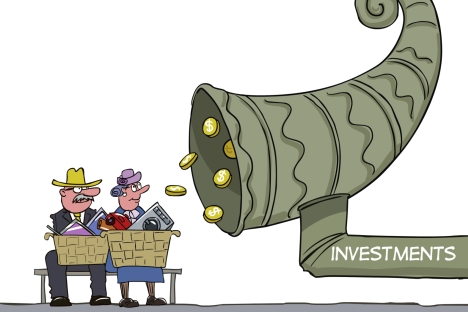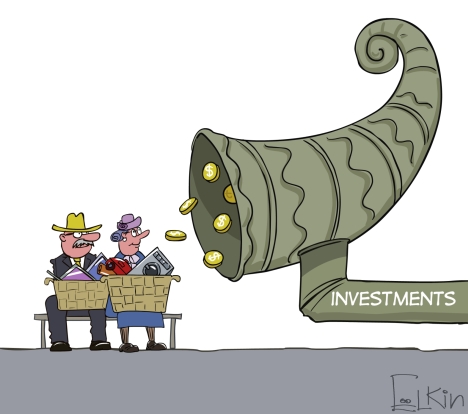Tackling pensions shortfall to improve business climate

Drawing by Sergey Yolkin. Click to enlarge the image.
President Vladimir Putin’s “Road Maps,” which have set out paths to improve the country’s business climate, are a good start. Yet expedited building permits and efficient customs can only help so much.
The total business tax burden in Russia is 30 percent higher than in neighboring Kazakhstan; energy prices here have caught up with those in the U.S.; and interest rates are the highest in the civilized world.
A key problem is the delay in tackling pension reform, which has been postponed until 2014. The government’s strategy has been criticized by many in the business community. How the pension system works is vital for businesses, because their insurance premiums are the main source of Pension Fund contributions and the size of premiums (and procedures for their accrual and payment) affect businesses’ profitability and outlook.
When premiums were raised to 34 percent in 2011 (they were later cut to 30 percent after an outcry), the share of under-the-table salaries rose to 41 percent from 9 percent – a level not seen for over a decade. Pension Fund income fell and the whole economy suffered.
The government’s current path will not tackle the pensions shortfall. They will make businesses pay and raise social contributions again. Business association Delovaya Rossiya has proposed detailed reforms that would solve the problem, however – by financing pensions from different sources, depending on citizens’ ages.
Under these proposals, Russians born 1967 or later would accrue accumulated pensions through the Pension Fund. For current pensioners and those who will retire soon, a Fund for Senior Generations would be set up, funded with revenues from privatization, oil and gas companies’ dividends, tobacco and alcohol taxes and a luxury property tax. This would enable reasonable pensions to be paid to non-working pensioners, and could re-energize the lethargic privatization program.
Yet the problem is bigger than specific reforms on pensions, tax, credit, tariffs and infrastructure.
We need a program to develop the non-commodity sectors, to industrialize and develop competition and the entire private sector. If we can meet these challenges, Russia has excellent, virtually unique opportunities for growth. We have huge potential in import substitution, commodities processing, high-tech, agriculture and transportation.
Russia has strong demand, buoyed by commodities, and is financially solvent and stable. We have the money and resources, technology and personnel: everything required for an economic breakthrough.
Boris Titov is the Russian President’s Ombudsman for Entrepreneurs’ Rights.
All rights reserved by Rossiyskaya Gazeta.
Subscribe
to our newsletter!
Get the week's best stories straight to your inbox
